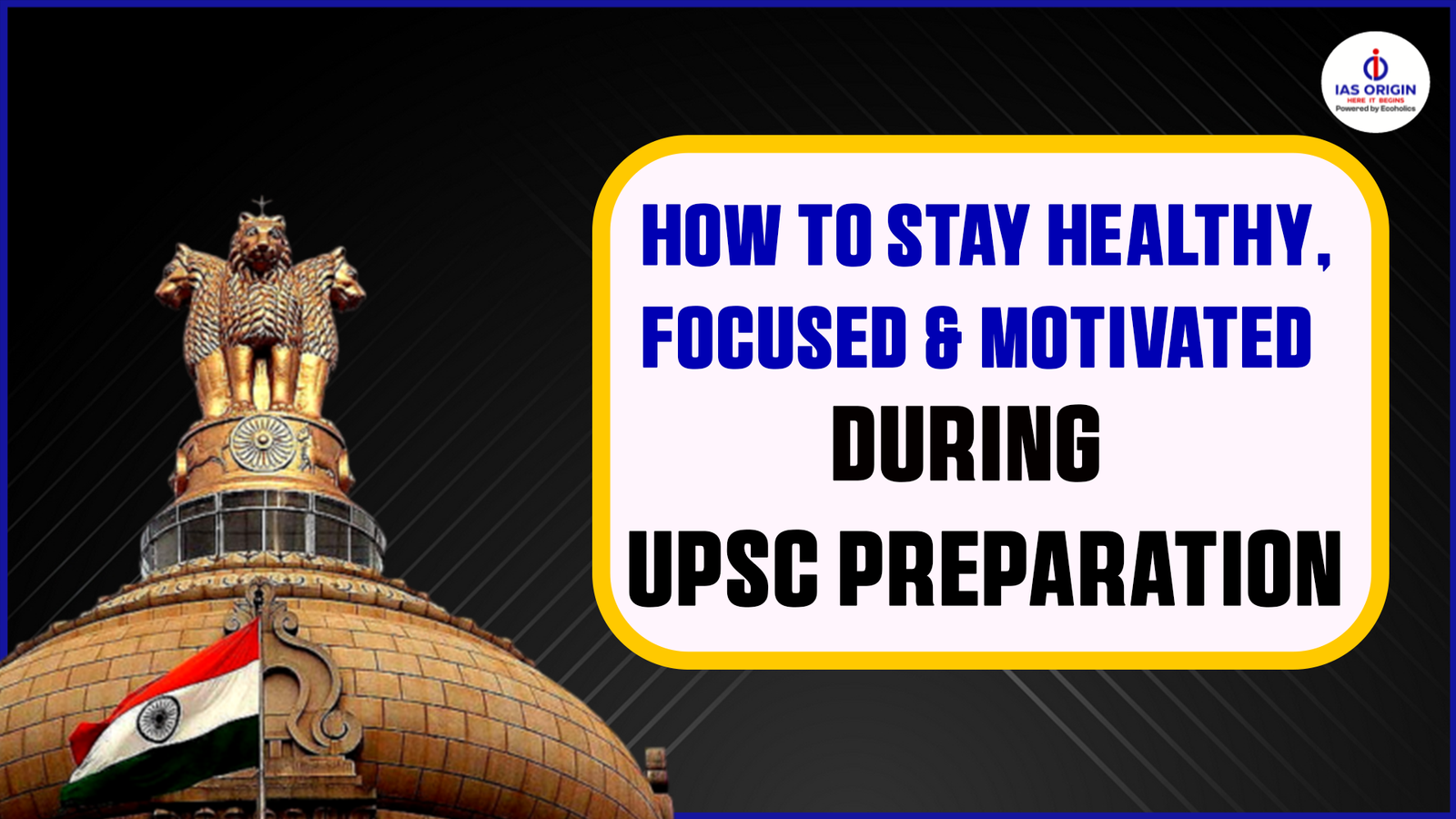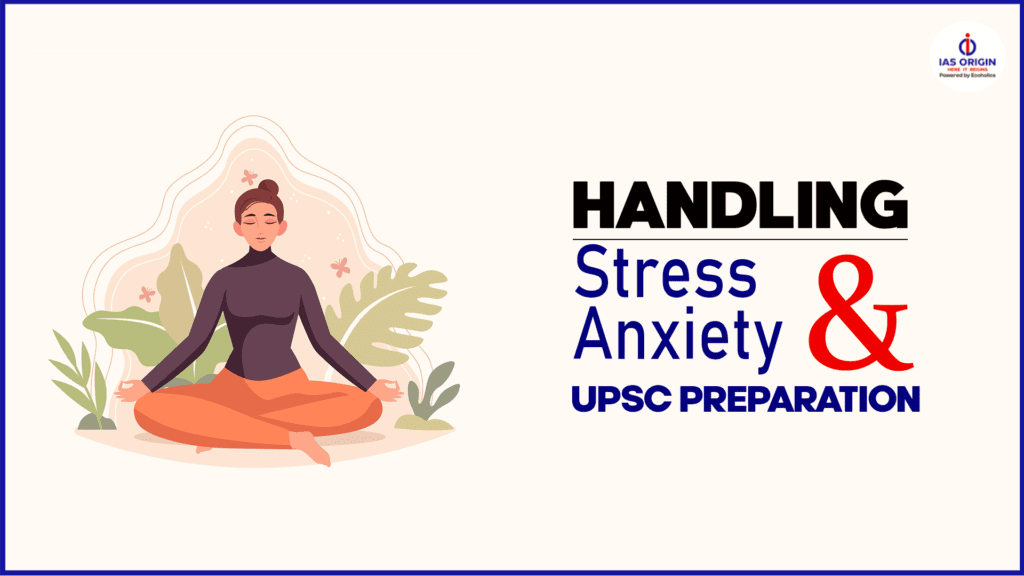
How to Stay Healthy, Focused & Motivated During UPSC Preparation
- Staying motivated, healthy, and focused throughout the UPSC preparation journey can be a mammoth task.
- Multiple strategies to avoid these traits and increase the chances of success are discussed below.
Staying healthy, focused, and motivated throughout the UPSC preparation journey can be demanding but necessary for success. Usually, an aspirant spends a couple of years in preparation and a considerably long time before that. The uncertainty of selection, cutthroat competition, and never-ending syllabus can harm your health, focus and motivation.
Experts & veterans have curated some tips that could help an aspirant stay healthy, focused and motivated during UPSC preparation. They should maintain a healthy height, exercise regularly, get enough sleep, effective stress management, create a comprehensive study schedule, join a study group, take breaks, avoid distractions, reward and believe in themselves, seek expert advice, and focus on why you wanted to crack UPSC in the first place.
Focus on your Why?
Having the exact answer of why you want to crack UPSC CSE can be the biggest motivator. It can compel you to stay healthy and focused and fuel your fire throughout the Union Public Service Commission Civil Service Examination journey. It provides direction and purpose to your trip and the added benefits mentioned below.

Suppose an aspirant has a clear idea and understanding of Why it provides direction and purpose in the daunting task of preparation. Nearly every day, aspirants have to indulge in long hours and adhere to a demanding schedule. Moreover, this connection can fuel intrinsic motivation and be the driving force when things get tough.
It is well-known that UPSC preparation is a marathon, not a sprint. During the journey, moments of doubt, fatigue and setbacks are bound to happen. This Why could work as an anchor, reminding you of the deeper reason behind all the hardships. External motivations like social pressure or parental motivation might need more in the long run.
It could be a great motivator when an aspirant connects their aspirations and desires to make a difference in society after becoming a civil servant. A clear answer to why can help you prioritise effectively during preparation. It also allows an aspirant to distinguish between activities that directly contribute to the goal and those that do not.
Maintain a Healthy Diet
A healthy mind resides in a healthy body, and every aspirant needs a healthy mind to boost chances of success. Maintaining a healthy diet can be crucial to success during UPSC preparation in more ways than one. It enhances cognitive functions, increases energy levels, improves mood, reduces stress, and helps provide better sleep quality while boosting overall physical health.

The human brain relies heavily on specific nutrients to function correctly. A balanced diet rich in fruits, vegetables, whole grains, and lean proteins helps in providing essential vitamins, minerals, and healthy fats. All these help boost memory, focus, concentration and cognitive processing.
Consumption of complex carbohydrates from whole grains and healthy fats ensures higher energy levels throughout the day. Certain foods like fruits, vegetables and fish are rich in antioxidants and other mood-boosting nutrients. A balanced diet contributes to a positive mental state and directly helps in effective learning and managing the pressures of UPSC preparation.
Aspirants should focus on whole and unprocessed foods and limit the intake of processed foods, sugary drinks and excessive saturated and unhealthy fats. They should focus on staying hydrated and eating regular meals and snacks. Again, they should remember that UPSC requires a healthy mind, and a healthy mind resides in a healthy body.
Exercise Regularly & Get Enough Sleep
The two crucial pillars for UPSC success are regular exercise and getting enough sleep, as they facilitate physical and mental well-being. Regular exercise enhances cognitive functions and stress management ability, increases energy levels and improves sleep quality. Getting enough sleep enhances memory, improves cognitive functions, reduces stress and anxiety, and improves mood and motivation.

Engaging in physical activity increases blood flow to the brain, promotes the growth of new brain cells and improves cognitive functioning. It directly translates to better focus, memory, concentration, and learning ability. Exercise is also a natural stress buster; it releases endorphins that improve mood and reduce anxiety.
Additionally, regular exercise improves cardiovascular health and stamina. Plus, it also promotes the possibility of better sleep quality. When an aspirant indulges in a regular exercise schedule, it improves discipline, regulates sleep-wake cycles and streamlines the circadian rhythm.
Aspirants are already burdened with vast syllabi, mock tests, self-study, etc. Hence, they are advised to aim for at least 30 minutes of moderate-intensity exercise most days. Developing a consistent sleep schedule, avoiding taking afternoon naps, and optimising your sleep schedule could be very helpful in UPSC preparation.
How to Manage Stress during UPSC Preparation?
UPSC preparation can be a stressful journey. Successfully managing stress can be a boon for any aspirant as it could help maintain well-being, focus and motivation throughout UPSC CSE’s demanding and stressful journey. To stay motivated, they can develop a well-structured study plan, prioritise healthy habits, practice relaxation techniques, maintain a positive mindset and seek expert help if necessary.

While developing a comprehensive and well-structured study plan, aspirants should understand the syllabus and exam pattern. Based on this knowledge, they can create a realistic and well-organised study schedule, breaking down the immense syllabus into smaller and manageable chunks. Setting a schedule of achievable daily and weekly goals could be a solid tool for stress management.
Aspirants must also work on prioritising healthy habits, including maintaining a balanced diet, exercising regularly, getting enough sleep, and staying away from distractions. Consume healthy food to fuel your brain with the required minerals and vitamins. Engage in regular workout schedules and try to get 7-8 hours of quality sleep every night. All these can significantly reduce the stress during UPSC preparation.
Apart from this, engaging in mindfulness meditation and yoga can be of great help, as they could help reduce anxiety and improve focus. With yoga, aspirants can combine physical posture, breathing exercises, and meditation, offering a holistic approach to optimal stress management.
Creating a Comprehensive Study Schedule and Other Aspects
Indulging in UPSC CSE with a study schedule can be a good decision. Experts assert that curating and following a well-crafted schedule forms the backbone of UPSC preparation. Curating a study schedule also enhances an aspirant’s organisational and time management skills, improves focus and concentration, and helps increase productivity and efficiency while boosting the chances of success.
Breaking down the vast syllabus into manageable chunks helps cover every topic systematically and efficiently. Aspiring students can prevent procrastination by allocating dedicated time slots for different subjects and ensuring a balanced coverage.
Knowing what to study eliminates decision fatigue and ensures that the focus remains entirely on the task. Creating a predictable schedule helps minimize distractions and reduce anxiety. Optimising study time also eliminates unnecessary breaks and distractions. If an aspirant strictly adheres to the study schedule, it provides a sense of accomplishment and boosts the chances of success.
Taking Breaks
Aspirants are highly advised to take short breaks every 45-60 minutes to prevent mental fatigue and improve information retention. A comprehensive study schedule should also allow some time for physical activity, relaxation techniques, and hobbies that refresh your mind and body. Taking breaks also helps maintain focus and concentration during more extensive study sessions.

Avoid Distractions UPSC Preparation
The world is full of distractions, and UPSC CSE aspirants are highly recommended to avoid distractions to increase their chances of success. They can minimize interruptions by silencing notifications, putting your phone away for some time and creating a quiet study environment.

Aspirants can also use website blockers or apps to minimize distractions from social media and other online platforms. They can also use a stopwatch to focus on their study and avoid any distractions for the time being. This enhances focus and concentration and helps retain information for extended periods.
Reward Yourself & Celebrate Small Victories
Many aspirants plan on rewarding themselves only when they crack the UPSC CSE; this might take more time than imagined. To stay motivated, aspirants should celebrate milestones and achievements, whether they are big or small, to reinforce positive study habits.
Give yourself a treat if you complete a chapter, watch your favourite episode or web series if you completed the syllabus, and go for a movie when you score high in mock tests. All these would trigger the reward mechanism and help you stay motivated. But remember, this reward mechanism should stay moderate and focus on your goal.
Believe in Yourself UPSC Preparation
Scoring low in mock tests, being unable to complete the syllabus, or missing the chance to crack the exam this year can hinder your belief in yourself. However, aspirants should develop a positive attitude and maintain self-belief throughout preparation. During hard times, aspirants can visualise themselves walking through the gates of LBSNAA or becoming successful civil servants, as this tactic can boost your belief in yourself.
The UPSC preparation journey can be tiring, boring and least enjoyable, but it can make a huge difference if an aspirant is committed to the cause. They should work on staying motivated, eating a healthy diet, and remaining focused on the final goal. At IAS Origin, experts can guide you through all these, so if you are facing any such challenges or wish to crack UPSC in your next attempt, book a free consultation today.



